人教版九年级全册Unit 3Could you please tell me where the restrooms are? Section B (2a_2d)课件(共26张PPT,内嵌音频)
文档属性
| 名称 | 人教版九年级全册Unit 3Could you please tell me where the restrooms are? Section B (2a_2d)课件(共26张PPT,内嵌音频) | 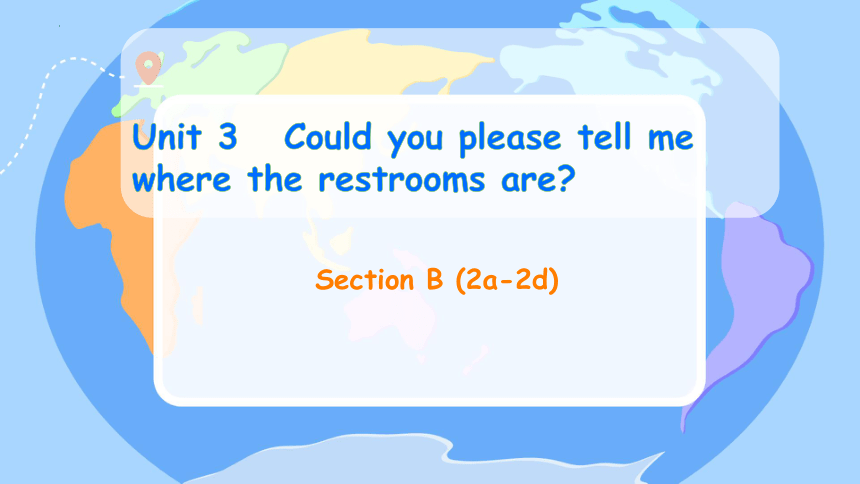 | |
| 格式 | pptx | ||
| 文件大小 | 9.6MB | ||
| 资源类型 | 教案 | ||
| 版本资源 | 人教新目标(Go for it)版 | ||
| 科目 | 英语 | ||
| 更新时间 | 2024-09-13 07:14:13 | ||
图片预览

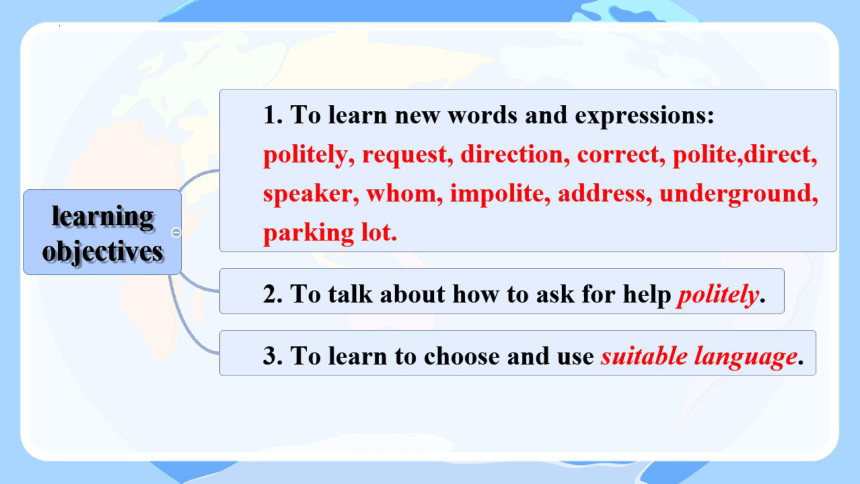
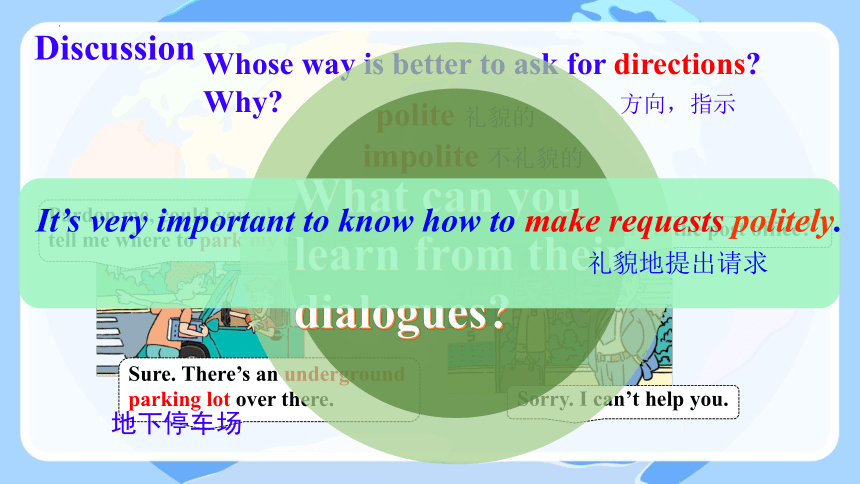
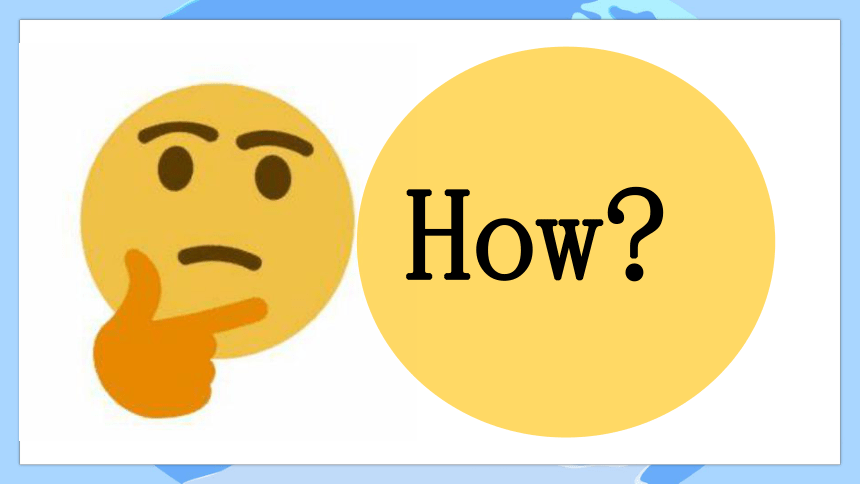
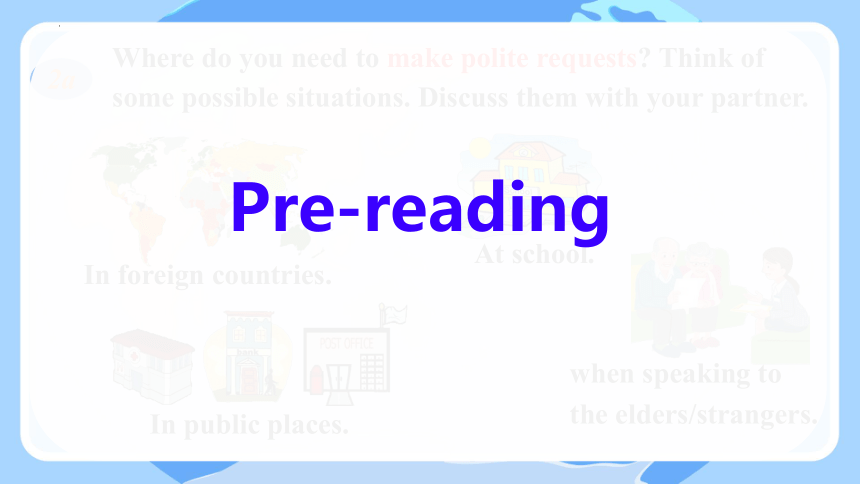
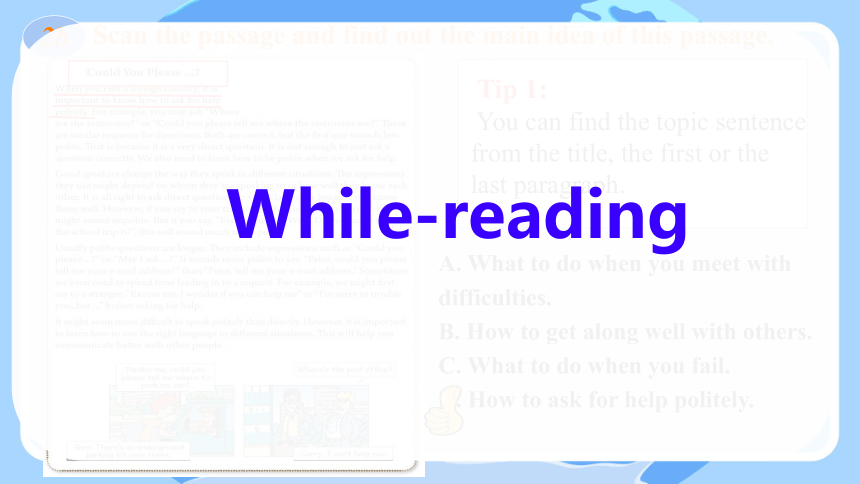
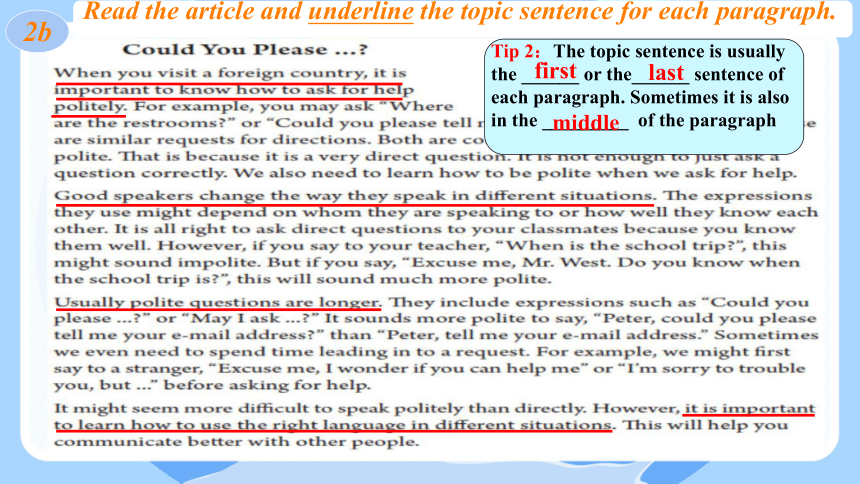
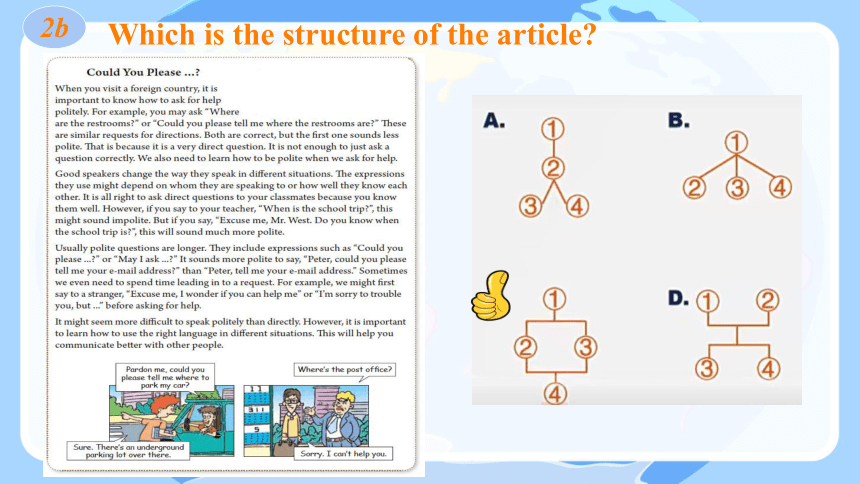
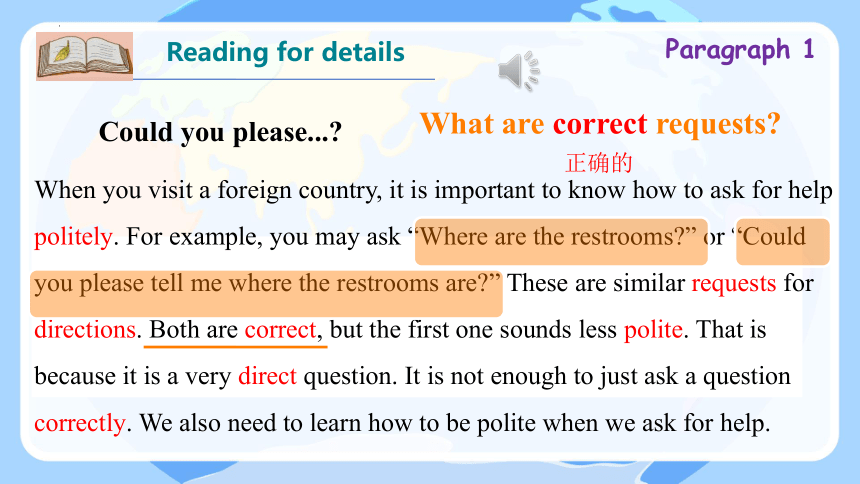
文档简介
(共26张PPT)
Unit 3 Could you please tell me where the restrooms are
Section B (2a-2d)
Discussion
Pardon me, could you please tell me where to park my car
Sure. There’s an underground parking lot over there.
Where is the post office
Sorry. I can’t help you.
Whose way is better to ask for directions Why 方向,指示
polite 礼貌的
impolite 不礼貌的
停车
地下停车场
What can you learn from their
dialogues
It’s very important to know how to make requests politely.
礼貌地提出请求
Reading 2a-2d
How
In foreign countries.
In public places.
At school.
when speaking to
the elders/strangers.
Where do you need to make polite requests Think of some possible situations. Discuss them with your partner.
2a
Pre-reading
Scan the passage and find out the main idea of this passage.
A. What to do when you meet with difficulties.
B. How to get along well with others.
C. What to do when you fail.
D. How to ask for help politely.
Tip 1:
You can find the topic sentence from the title, the first or the last paragraph.
2b
While-reading
Tip 2:The topic sentence is usually the ______ or the______ sentence of each paragraph. Sometimes it is also in the _________ of the paragraph
first
last
middle
2b
Read the article and underline the topic sentence for each paragraph.
Which is the structure of the article
2b
Paragraph 1
When you visit a foreign country, it is important to know how to ask for help politely. For example, you may ask “Where are the restrooms ” or “Could you please tell me where the restrooms are ” These are similar requests for directions. Both are correct, but the first one sounds less polite. That is because it is a very direct question. It is not enough to just ask a question correctly. We also need to learn how to be polite when we ask for help.
Reading for details
What are correct requests
正确的
Could you please...
Paragraph 1
Reading for details
直接的
direct question
“Where are the
restrooms ”
“Could you please tell me where the restrooms are ”
polite request
Reading for details
Find the direct questions and polite requests.
“Where are the restrooms ”
“Could you please tell me
where the restrooms are ”
direct question
polite request
“When is the school trip ”
“Excuse me, Mr. West. Do you know when the school trip is ”
“Peter, tell me your e-mail address.”
“Peter, could you please tell me
your e-mail address ”
2c
Paragraph 2
Good speakers change the way they speak in different situations. The expressions they use might depend on whom they are speaking to or how well they know each other. It is all right to ask your classmates direct questions because you know them well. However, if you say to your teacher, “When is the school trip ”, this might sound impolite. But if you say, “Excuse me, Mr. West. Do you know when the school trip is ”, this will sound much more polite.
Reading for details
What might the expressions you use depend on
When you ask a stranger
for information,
You would say ________,
A. Where is the restroom
B. Could you tell me where
the restroom is
When you ask your teacher
about something,
You would say ________,
A. When is the school trip
B. Could you please tell
me when the school trip is
When you ask your little
brother to do something,
You would say ________,
A. Pass me the salad.
B. Could you please pass
me the salad
Paragraph 3
Usually polite questions are longer. They include expressions such as “Could you please ... ” or “May I ask ... ” It sounds more polite to say, “Peter, could you please tell me your e-mail address ” than “Peter, tell me your e-mail address.” Sometimes we even need to spend time leading into a request. For example, we might first say to a stranger , “Excuse me, I wonder if you can help me” or “I’m sorry to trouble you, but ...” before asking for help.
Reading for details
using polite questions
They include expressions.
——————————————————————
We even need to spend time leading into a request.
__________________________________________
“Excuse me, I wonder if you can help me” or “I’m sorry to trouble you, but…”
“Could you please…” or “May I ask…”
longer
Read Para. 3 and answer.
Para. 3: Usually polite questions are longer.
Where is the post office
Sorry. I can’t help you.
Can you make the request longer and more polite
Excuse me, could you please tell me where the post office is
He may say
Excuse me, I wonder if you can help me. Do you know
where the post office is
Pardon me, may I ask if there is a post office near here.
.......
Paragraph 4
It might seem more difficult to speak politely than directly. However, it is important to learn how to use the right language in different situations. This will help you communicate better with other people.
It might seem to speak politely. , it is important to learn how to use the language . This will help you communicate better with other people.
more difficult
in different situations
However
right
Why should we use the right language in different situations
USING SUITABLE LANGUAGE
In different situations, you need to choose and use suitable language based on cultural knowledge.
Reading Strategy
=right
It is important to know how to ____________ politely. It is not enough to just ask a question ________. We also need to learn how to ____________ when we ask for help.
Good speakers ________ the way they speak in __________________. The expressions they use might _________ whom they are speaking to or how well they know _________.
ask for help
correctly
be polite
change
different situations
depend on
each other
Retelling
And direct questions sounds _________. Usually polite questions are _________ . Sometimes we even need to spend time ____________ a request. It might seem more
difficult to speak _________ than _________. But using
the right language in different situations will help you
______________________ other people.
impolite
longer
leading into
politely
directly
communicate better with
Request Person Place
1.Will you pass the salt
2. Do you know where I can change some money, please
3. Could you tell me what just happened
4. Can you please tell me where the nearest station is
5. Excuse me, do you know what time it begins, please
6.Let me know when you’re ready, OK
7.Could you possibly tell me the way to the village school
A
restaurant/home
B
street
any public places/home
A/B
B
street
B
movie theatre/center hall
A
home
B
street
A: someone you know B: stranger
2d
Para 1. What are correct requests
Summary
Para 2&3. How to make polite requests
Para 4. Why should we use the right language
direct questions
polite requests
changing the way in different situations
using polite questions
to communicate better with other people.
Wherever you go, whatever you do,
and whoever you are. Please remember:
Talk to others suitably.
Treat others politely.
Think for others sincerely.
问道
明礼
慎思
Are you ready to talk to others suitably
Homework
必做:
1. Finish period 5 on exercise book
2. Write down your answer to the question "In China, is it necessary to make polite requests to our family members ".
选做:
Search for more cultural knowledge about being polite in different countries.
Unit 3 Could you please tell me where the restrooms are
Section B (2a-2d)
Discussion
Pardon me, could you please tell me where to park my car
Sure. There’s an underground parking lot over there.
Where is the post office
Sorry. I can’t help you.
Whose way is better to ask for directions Why 方向,指示
polite 礼貌的
impolite 不礼貌的
停车
地下停车场
What can you learn from their
dialogues
It’s very important to know how to make requests politely.
礼貌地提出请求
Reading 2a-2d
How
In foreign countries.
In public places.
At school.
when speaking to
the elders/strangers.
Where do you need to make polite requests Think of some possible situations. Discuss them with your partner.
2a
Pre-reading
Scan the passage and find out the main idea of this passage.
A. What to do when you meet with difficulties.
B. How to get along well with others.
C. What to do when you fail.
D. How to ask for help politely.
Tip 1:
You can find the topic sentence from the title, the first or the last paragraph.
2b
While-reading
Tip 2:The topic sentence is usually the ______ or the______ sentence of each paragraph. Sometimes it is also in the _________ of the paragraph
first
last
middle
2b
Read the article and underline the topic sentence for each paragraph.
Which is the structure of the article
2b
Paragraph 1
When you visit a foreign country, it is important to know how to ask for help politely. For example, you may ask “Where are the restrooms ” or “Could you please tell me where the restrooms are ” These are similar requests for directions. Both are correct, but the first one sounds less polite. That is because it is a very direct question. It is not enough to just ask a question correctly. We also need to learn how to be polite when we ask for help.
Reading for details
What are correct requests
正确的
Could you please...
Paragraph 1
Reading for details
直接的
direct question
“Where are the
restrooms ”
“Could you please tell me where the restrooms are ”
polite request
Reading for details
Find the direct questions and polite requests.
“Where are the restrooms ”
“Could you please tell me
where the restrooms are ”
direct question
polite request
“When is the school trip ”
“Excuse me, Mr. West. Do you know when the school trip is ”
“Peter, tell me your e-mail address.”
“Peter, could you please tell me
your e-mail address ”
2c
Paragraph 2
Good speakers change the way they speak in different situations. The expressions they use might depend on whom they are speaking to or how well they know each other. It is all right to ask your classmates direct questions because you know them well. However, if you say to your teacher, “When is the school trip ”, this might sound impolite. But if you say, “Excuse me, Mr. West. Do you know when the school trip is ”, this will sound much more polite.
Reading for details
What might the expressions you use depend on
When you ask a stranger
for information,
You would say ________,
A. Where is the restroom
B. Could you tell me where
the restroom is
When you ask your teacher
about something,
You would say ________,
A. When is the school trip
B. Could you please tell
me when the school trip is
When you ask your little
brother to do something,
You would say ________,
A. Pass me the salad.
B. Could you please pass
me the salad
Paragraph 3
Usually polite questions are longer. They include expressions such as “Could you please ... ” or “May I ask ... ” It sounds more polite to say, “Peter, could you please tell me your e-mail address ” than “Peter, tell me your e-mail address.” Sometimes we even need to spend time leading into a request. For example, we might first say to a stranger , “Excuse me, I wonder if you can help me” or “I’m sorry to trouble you, but ...” before asking for help.
Reading for details
using polite questions
They include expressions.
——————————————————————
We even need to spend time leading into a request.
__________________________________________
“Excuse me, I wonder if you can help me” or “I’m sorry to trouble you, but…”
“Could you please…” or “May I ask…”
longer
Read Para. 3 and answer.
Para. 3: Usually polite questions are longer.
Where is the post office
Sorry. I can’t help you.
Can you make the request longer and more polite
Excuse me, could you please tell me where the post office is
He may say
Excuse me, I wonder if you can help me. Do you know
where the post office is
Pardon me, may I ask if there is a post office near here.
.......
Paragraph 4
It might seem more difficult to speak politely than directly. However, it is important to learn how to use the right language in different situations. This will help you communicate better with other people.
It might seem to speak politely. , it is important to learn how to use the language . This will help you communicate better with other people.
more difficult
in different situations
However
right
Why should we use the right language in different situations
USING SUITABLE LANGUAGE
In different situations, you need to choose and use suitable language based on cultural knowledge.
Reading Strategy
=right
It is important to know how to ____________ politely. It is not enough to just ask a question ________. We also need to learn how to ____________ when we ask for help.
Good speakers ________ the way they speak in __________________. The expressions they use might _________ whom they are speaking to or how well they know _________.
ask for help
correctly
be polite
change
different situations
depend on
each other
Retelling
And direct questions sounds _________. Usually polite questions are _________ . Sometimes we even need to spend time ____________ a request. It might seem more
difficult to speak _________ than _________. But using
the right language in different situations will help you
______________________ other people.
impolite
longer
leading into
politely
directly
communicate better with
Request Person Place
1.Will you pass the salt
2. Do you know where I can change some money, please
3. Could you tell me what just happened
4. Can you please tell me where the nearest station is
5. Excuse me, do you know what time it begins, please
6.Let me know when you’re ready, OK
7.Could you possibly tell me the way to the village school
A
restaurant/home
B
street
any public places/home
A/B
B
street
B
movie theatre/center hall
A
home
B
street
A: someone you know B: stranger
2d
Para 1. What are correct requests
Summary
Para 2&3. How to make polite requests
Para 4. Why should we use the right language
direct questions
polite requests
changing the way in different situations
using polite questions
to communicate better with other people.
Wherever you go, whatever you do,
and whoever you are. Please remember:
Talk to others suitably.
Treat others politely.
Think for others sincerely.
问道
明礼
慎思
Are you ready to talk to others suitably
Homework
必做:
1. Finish period 5 on exercise book
2. Write down your answer to the question "In China, is it necessary to make polite requests to our family members ".
选做:
Search for more cultural knowledge about being polite in different countries.
同课章节目录
- Unit 1 How can we become good learners.
- Section A
- Section B
- Unit 2 I think that mooncakes are delicious!
- Section A
- Section B
- Unit 3 Could you please tell me where the restroom
- Section A
- Section B
- Unit 4 I used to be afraid of the dark.
- Section A
- Section B
- Unit 5 What are the shirts made of?
- Section A
- Section B
- Review of Units 1-5
- Unit 6 When was it invented?
- Section A
- Section B
- Unit 7 Teenagers should be allowed to choose their
- Section A
- Section B
- Unit 8 It must belong to Carla.
- Section A
- Section B
- Unit 9 I like music that I can dance to.
- Section A
- Section B
- Unit 10 You're supposed to shake hands.
- Section A
- Section B
- Review of Units 6-10
- Unit 11 Sad movies make me cry.
- Section A
- Section B
- Unit 12 Life is full of the unexpected
- Section A
- Section B
- Unit 13 We're trying to save the earth!
- Section A
- Section B
- Unit 14 I remember meeting all of you in Grade 7.
- Section A
- Section B
- Review of Units 11-14
